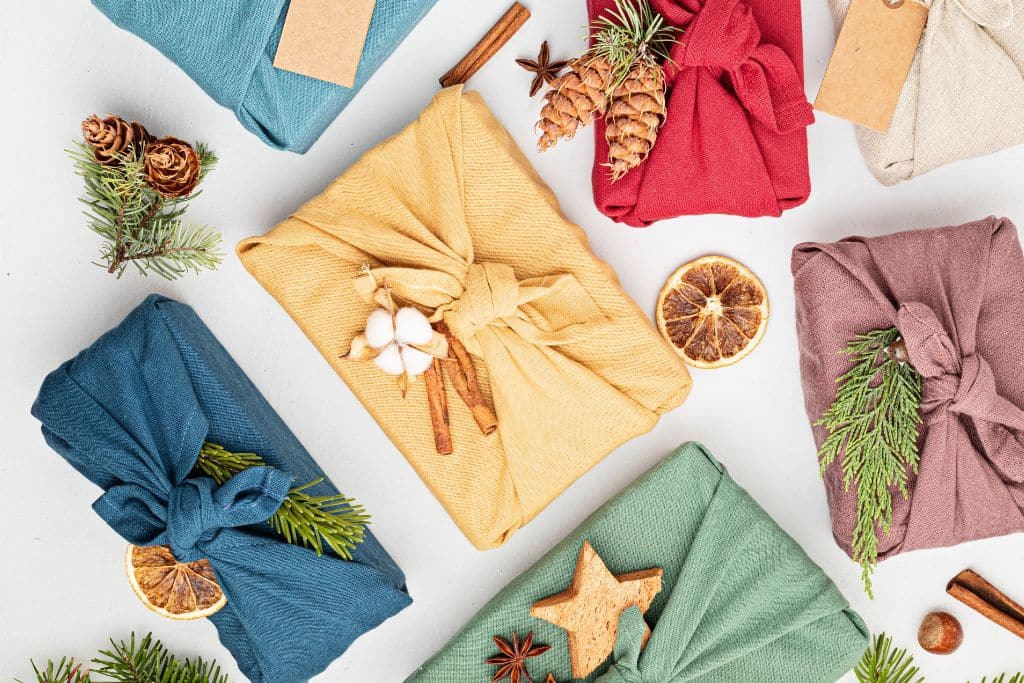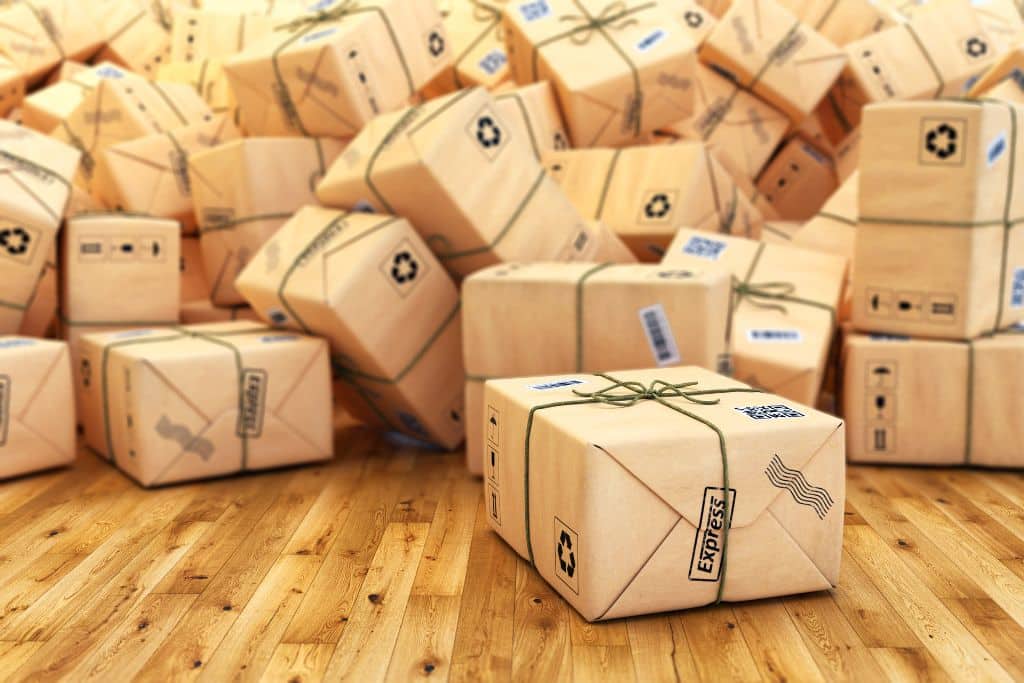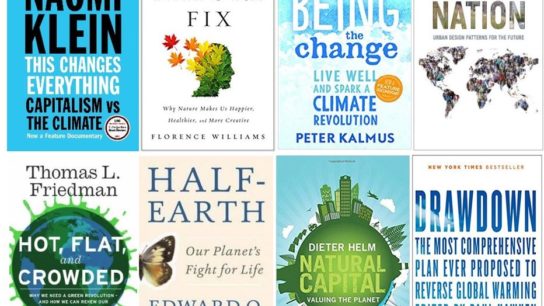While packaging is an essential component of several industries, from food and beverages to shipping and retail, it also contributed to extremely unsustainable quantities of waste and pollution. To celebrate Plastic Free July, here are five sustainable packaging solutions you can opt for in your everyday life.
—
8 Sustainable Packaging Solutions
1. Plant-Based Compostable Packing Peanuts (inspired by Lush Cosmetics)
First on the list of sustainable packaging solutions is a product by British cosmetics giant Lush. The retailer has developed an innovative eco-friendly, recyclable peanut made from a combination of water and a starch-based material. From taking up to 23% less energy to produce to being fully biodegradable and compostable, these pillowy nuggets are a great alternative to polystyrene gift packages.
The company – which pays particular attention to the topic of sustainability – also sells its products in pots and bottles in 100% post-consumer plastic that can be returned to any shop after use and ships all of its online ordered in 100% recycled and recyclable cardboard boxes.
2. Corn Starch Adhesive Transparent Packaging Tape (inspired by BioPack)
BioPack – a company specialise din compostable raw materials and products such as compostable films, bags, bups, and tableware – has developed a unique adhesive tape applicable to all shipping boxes and packages that can fully biodegrade within a few months.
The compostable transparent tape’s film is made of 100% polyactic acid (PLA), a thermoplastic monomer derived from renewable, organic sources such as corn starch or sugar cane and a perfect replacement for Biaxially-Oriented Polypropylene (BOPP), a popular label material made of plastic. The latter cannot be degraded and this complicated the recycling process of carton packaging, as it must be stripped first and then treated as garbage. The adhesive glue is also mainly composed of renewable raw materials and manufactured without additional treatment.
3. Gift-wrapping with Cloths (inspired by Furoshiki Wrap Company)
Established in November, Furoshiki Wrap Company produces and promotes the use of furoshiki, gift wraps inspired by the Japanese tradition that favour cloth fabric instead of traditional wrapping paper. The family run business based in North Devon, UK, holds sustainability at the heart of its operations, working and supporting other independent local businesses whenever possible. Their wrapping cloths are made with ethically-sourced materials and sold in plastic-free, eco-friendly packaging.
The Furoshiki tradition embraces upcycling as people can create their own cloth either with leftovers from previous projects or garments that are no longer useful. Apart from wrapping gifts, these versatile cloths are commonly used as shopping bags, picnic hampers, tablecloths and household decor.

You might also like: We Need Sustainable Food Packaging Now. Here’s Why.
4. Plantable Packaging (inspired by Botanical PaperWorks)
Another widely applicable, sustainable packaging solution is the plantable packaging developed by Botanical PaperWorks, a Canadian brand committed to running the business in a way that benefits the environment and the community in which it is been “planted”.
Indeed, the company is renowned for its plantable, eco-friendly seed paper, which composts away when planted, leaving wildflowers, herbs, and vegetables and no waste behind. It is manufactured with post-consumer materials and post-industrial waste embedded with seeds. The paper is used to realise small boxes for light-weight items, gift wrap and tags but it can also be shredded and used as box filler.
5. Shower-Friendly Paper Bottle (inspired by Ecologic and Seed Phytonutrients)
Inspired by the zero-waste policy adopted by her daughter’s elementary school, Julie Corbett envisioned an environmentally-friendly paper bottle made from recycled materials. She turned that idea into Ecologic, a California-based company claiming to offer the “world’s only commercially-viable paper bottles” made from 100% post-consumer recycled and water-resistant paper. To ensure that the product inside stays safe and sanitary, the bottle is equipped with thin inner liners made with recycled and recyclable plastic. Instead of glue, the bottle is held together through interlocking.
The innovative bottle – used for products such as hand soap, all-purpose cleaner, and body wash – helps reducing the carbon footprint and reliance on single-use plastics, by using 70% less plastic than traditional containers.
6. Mushroom Packaging (inspired by Ecovative Design)
Next on our list of sustainable packaging solutions is the innovative design of Ecovative, a mushroom technology company founded in 2007 that designs and grows sustainable materials that come straight from nature. Its non-toxic and organic packaging and building materials are a matrix of mycelium – mushroom strains – fused with cleaned and ground agricultural waste, designed to perform just like plastic and leather and able to decompose at the end of their life. The raw materials can be moulded into whichever shape is desired and are used to ship a wide range of products – from bottle to candle and beauty products, as well as to create building materials and thermal insulation panels.
The environmental footprint of the products is minimised through the use of agricultural waste, reliance on natural and non-controlled growth environments, and home compostable final products.
7. Green Paper (inspired by J&J Green Paper)
J&J Green Paper is at the forefront of affordable paper coating process. While the polyethylene currently used to coat more than half the paper used globally for packaging does not biodegrade once it is applied to paper. “While paper on its own is not a threat to the environment, the supplemental coatings and chemicals added to it, like polyethylene to reinforce cups made to hold your morning coffee, pose a serious threat,” writes the company. “In fact, 58 billion paper coffee cups end up in landfills each year.”
The Miami-based company came up with a sustainable solution by developing JANUS, a biodegradable, recyclable and back yard compostable replacement for polyethylene, a game changer for the cosmetic, agricultural, packaging and F&B industries. The raw material needed for it production is readily available worldwide and the process uses the same technology as the current polyethylene. Therefore there is a seamless production process transfer with minimal supply chain disruption or friction.
8. Closed-Loop Distribution Technology (inspired by EcoSpirits)
Singapore-based ecoSPIRITS is an innovative closed-loop distribution system that offers one of the world’s first sustainable packaging solutions to spirits distribution by that nearly eliminating all packaging waste in the premium spirits supply chain. The company has introduced a change to the way alcohol is shipped and sold that could eliminate an average of 60% to 90% of the carbon dioxide associated with the traditional packaging and distribution of premium spirits, according to a study performed by Deloitte.
Instead of putting the liquid into glass bottles and then shipping them around the world, the producer transports the liquid in bulk. Once it reaches the local market, the drinks are decanted into smaller, reusable containers called ecoTotes that are sent to the venue, such as a bar or an hotel. There, the drink is put into the bottles that consumers are used to, or dispensed directly into a glass via an integral tap. The empty containers are returned to the processing plant for refilling. EcoSpirits estimates each ecoTote could eliminate more than 1,000 single-use glass bottles over its lifetime.
The company’s system has drawn partnerships with iconic hotels such as London’s Savoy and Singapore’s Raffles Hotel as well as global drinks brand Pernod Ricard.
“The transition to circular packaging technology is one of the most important movements in the spirits industry today,” Paul Gabie, ecoSPIRITS chief executive officer, said in an interview with Bloomberg. “Circular is one of the most effective ways for our industry to do its part in supporting the United Nations Sustainable Development Goals and the global drive to net-zero carbon emissions.
You might also like: Top Sustainable Food Packaging Companies to Support
Research for this article was conducted by Earth.Org research contributor Chloe Lam


















